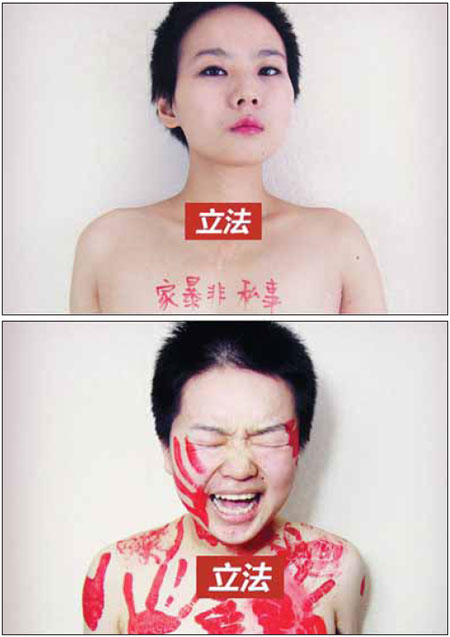Naked truth used to combat domestic violence
Updated: 2012-12-12 08:28
By China Daily (China Daily)
|
|||||||||||
|
Two of the women who have posted pictures of themselves online to raise awareness of domestic violence. Xiong Jing / for China Daily |
Topless, with her face and body covered in bloody handprints and her fists clenched, she stares out from the computer screen.
This is the self-portrait 24-year-old Xiong Jing posted in recent weeks on Sina Weibo, the popular micro-blogging website, as part of an online campaign against domestic abuse.
"By using this forum, I want to attract attention and raise people's awareness of violence against women," said Xiong, a web editor for Women's Voice and a volunteer with Women Network, a Beijing NGO.
Xiong said many Chinese still hold the traditional view that if a man beats his wife or children, it is the family's business, and others should not interfere. So, many victims suffer in silence.
To raise awareness of the issue, Xiong and a number of other volunteers, all in their 20s, posted semi-naked photos of themselves on Sina Weibo, and they were widely spread online.
Xiong said the first photo was posted on Nov 6 by a woman who blogs under the name Xiao Meini. She appeared naked with the message "Proud to have a flat chest. Shame on domestic violence" written on her body.
Xiao Meini, who also lives in Beijing, was unavailable for comment on Monday.
However, Xiong said her courage had inspired others to follow suit. And not only women.
Among the volunteers was a 40-year-old civil servant who gave only his surname, Gao.
"Although my wife wasn't totally behind the idea, I still posted my photo to show my support for the cause," he said. "The fight against domestic violence is not just women's battle. Men must also take responsibility."
The volunteers' efforts have not been praised by everyone.
"I received thousands of messages criticizing and cursing me after I put my naked photo online," said Xiao Tie, who works at the LGBT Center in Beijing and spoke on condition of being identified by her nickname.
She said she spent an entire day replying to all her critics, adding that they were very insulting about her "not-so-perfect figure".
"A woman's body, as well as domestic violence, are deemed as something private," she said. "The public can only accept big-bosomed female figures, not ours with flat chests and covered in blood. That's maybe why I was criticized so much.
"But if fashion magazines can use nude models on their covers to sell body lotion and perfume, why can't we use ours to promote our cause?" she added.
The group has achieved its goal of drawing attention. However, it insists it wants to do more than simply raise a few eyebrows.
These young women have been involved in a number of campaigns relating to women's rights, including an ongoing online movement to collect 10,000 signatures on a petition against domestic violence.
Once accomplished, the petition will be used in a letter to the Standing Committee of National People's Congress calling on legislators to accelerate the drafting of laws to end domestic abuse.
"Up to now, about 15 people have shared their naked photos in support," said Xiong with pride. "By doing this, we have collected more than 6,000 signatures."
Work on driving fresh legislation started in March when Zhen Yan, vice-president of the All-China Women's Federation, proposed a draft during the annual meetings of the nation's top legislative and advisory bodies. And in summer, the NPC announced it had included the law in its preparatory legislative agenda, which means members will continue research into the issue.
"A year has passed but we haven't heard of any updates," said Li Ying, an attorney at Beijing Juntai Law Firm who is the director of the Yuanzhong Gender Development Center.
"I applaud the courage, idealism and defiance of these volunteers, but the ends cannot justify the means," she said. "Their behavior, which is more like performance art, won't contribute much to the legislative process."
Li suggested a better way for campaigners to make their point would be to collect more vivid facts and detailed statistics that outline the urgency of the situation.
"Instead of relying on a sensational performance, the legislative work needs more reliable numbers and facts," she said. "That may be where the NGOs should start."
Data on domestic violence remains scant. However, in one of the few studies readily available, the Law Society found in 2011 that 30 percent of women in China have been victims of some form of domestic violence. The finding was based on a survey of 270 million people.
The same study also found that about 100,000 Chinese families a year break up because of domestic violence.
Yang Yao contributed to this story.
(China Daily 12/12/2012 page7)
Related Stories
Call for action on domestic violence 2012-11-26 11:06
Legislating domestic violence in China: Concepts - 中国反家庭暴力立法:概念 2012-05-24 07:27
Law on domestic violence 2012-05-08 08:00
Domestic violence law should be broad 2012-03-12 15:10
China mulls domestic violence law 2012-02-28 17:20
Experts call for domestic violence laws 2011-11-24 19:24
Today's Top News
President Xi confident in recovery from quake
H7N9 update: 104 cases, 21 deaths
Telecom workers restore links
Coal mine blast kills 18 in Jilin
Intl scholarship puts China on the map
More bird flu patients discharged
Gold loses sheen, but still a safe bet
US 'turns blind eye to human rights'
Hot Topics
Lunar probe , China growth forecasts, Emission rules get tougher, China seen through 'colored lens', International board,
Editor's Picks

|

|

|

|

|

|






